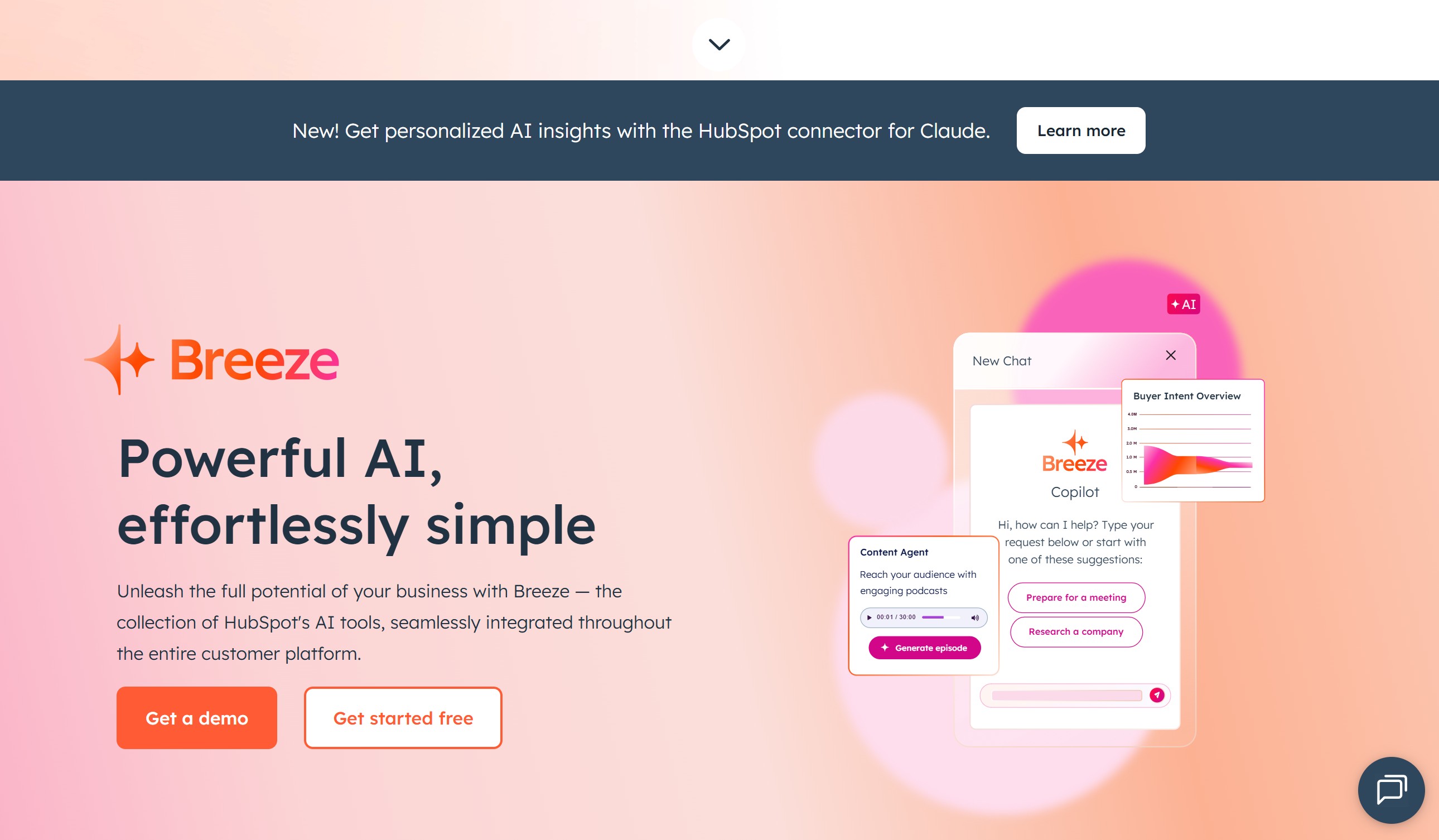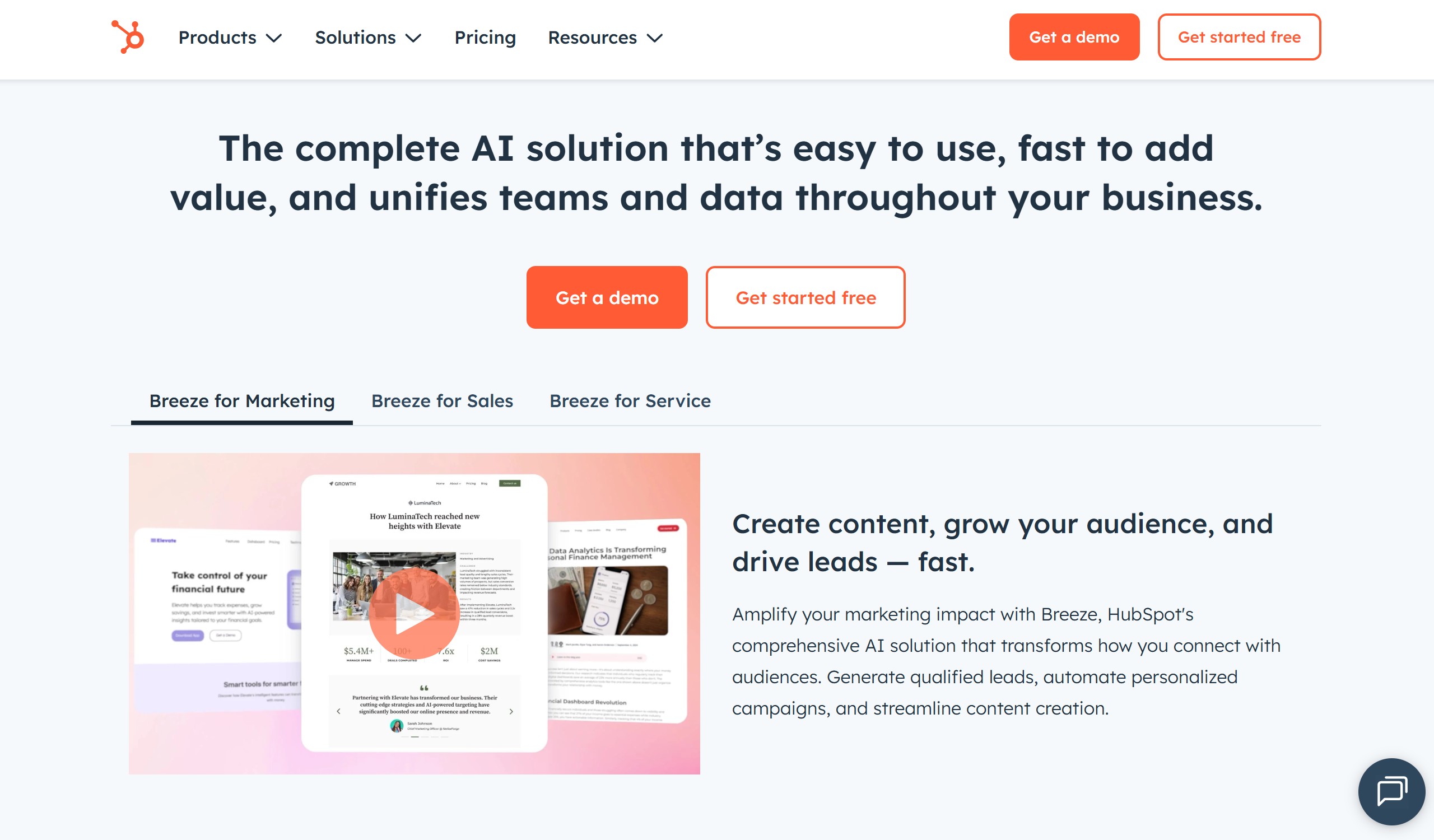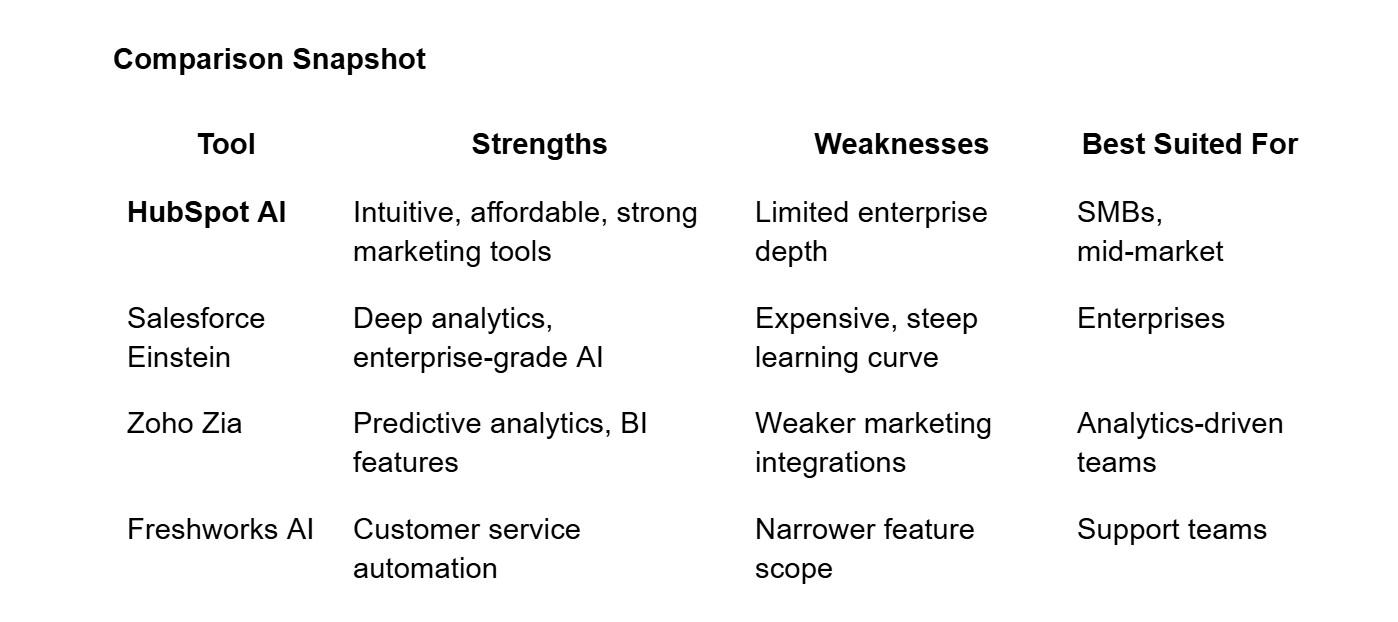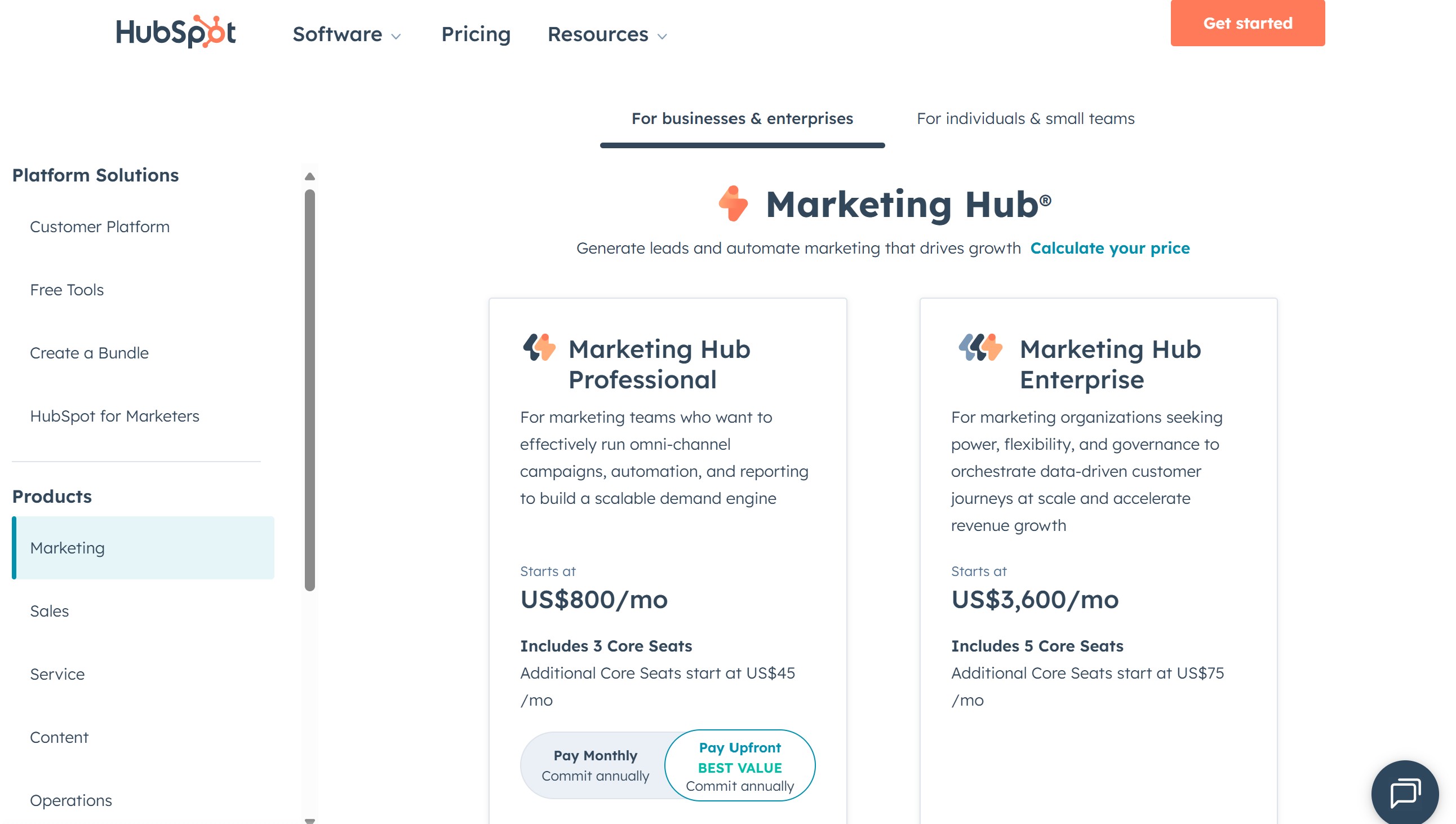HubSpot AI Tool Review 2025: Features, Use Cases, Pricing & Top Alternatives Compared

The HubSpot AI tool has become a game-changer in 2025 for businesses seeking smarter ways to manage marketing, sales, and customer service. As competition increases, companies need platforms that can combine efficiency with personalization. HubSpot has evolved beyond being just a CRM—it is now an AI-powered hub for managing customer relationships, optimizing marketing campaigns, and improving productivity.
Unlike traditional CRM tools, HubSpot integrates artificial intelligence across its ecosystem. From AI-driven content creation to predictive lead scoring, it empowers both beginners and advanced users to improve customer attraction and engagement. For marketers, this means generating high-quality content faster. For sales teams, it means focusing on leads that are most likely to convert. For customer service, it means AI chatbots handling common requests while human teams focus on complex cases.
This hubspot ai tool review explores its features, benefits, comparisons, and use cases. Whether you’re a small business looking for affordable automation or an enterprise scaling global campaigns, HubSpot AI has positioned itself as one of the top hubspot ai tools in the market.
2. What is the HubSpot AI Tool?
The HubSpot AI tool is an AI-powered extension of HubSpot’s CRM ecosystem.
It helps businesses automate marketing, sales, and customer service tasks.
The tool uses artificial intelligence to generate marketing content.
It can write emails, blog posts, and social media captions instantly.
AI-driven insights support predictive lead scoring for sales teams.
This means sales reps can focus on high-converting prospects.
The tool also provides real-time analytics on customer behavior.
HubSpot AI integrates with chatbots for customer service automation.
AI chatbots handle FAQs, booking requests, and simple support tickets.
The system also provides personalization at scale for campaigns.
Emails and landing pages can be tailored to individual behaviors.
HubSpot AI supports beginners with pre-built templates.
It is designed to be intuitive and beginner-friendly.
Advanced users benefit from customization options in workflows.
AI suggestions guide users on improving campaigns.
The platform integrates with third-party apps for flexibility.
It works seamlessly with tools like Slack, Gmail, and Zoom.
HubSpot AI connects marketing, sales, and customer service into one workflow.
The AI-powered hubspot ai tool features improve productivity across departments.
It reduces repetitive work and supports growth strategies.
By combining CRM data with AI, HubSpot creates actionable insights.
This makes it one of the best hubspot ai tools available in 2025.
3. Key Features & Benefits

The HubSpot AI tool provides a wide range of features designed to make marketing and sales processes more efficient. Its integration into HubSpot’s CRM ensures that users get the benefits of AI without leaving the platform they already know.
One of the most valuable features is the AI writing assistant. Marketers can generate blog outlines, email drafts, and ad copy in seconds. This saves hours of manual work and ensures teams maintain a consistent tone across campaigns. Businesses using the writing assistant report faster campaign turnaround and improved engagement rates.
The tool also offers predictive lead scoring, which helps sales teams prioritize leads based on conversion likelihood. Instead of chasing every prospect, sales reps can focus on the 20% of leads most likely to convert. Companies that adopt predictive scoring often see an increase in conversion rates and a more efficient sales pipeline.
Another standout feature is AI-powered chatbots for customer service. These bots answer common questions, book appointments, and guide users through FAQs. By handling repetitive tasks, chatbots reduce strain on support teams, allowing human agents to resolve more complex issues. This results in faster response times and improved customer satisfaction.
HubSpot AI also supports personalization at scale. It automatically tailors email content, landing pages, and recommendations based on customer interactions. Personalization has been shown to boost open rates by as much as 29% and click-through rates by 41%, making this feature critical for competitive marketing strategies.
For beginners, HubSpot offers pre-built AI templates. These simplify the onboarding process, allowing small businesses to launch campaigns quickly. At the same time, advanced users can customize workflows, ensuring the AI aligns with unique business strategies.
The platform also benefits from seamless integrations. HubSpot AI works with tools like Gmail, Slack, Zoom, and eCommerce platforms, making it flexible across industries. Businesses can unify marketing, sales, and service in one workflow without managing multiple disjointed tools.
In short, the hubspot ai tool features are designed to increase productivity, reduce repetitive tasks, and maximize ROI. Whether used for creating content, scoring leads, or supporting customers, HubSpot’s AI suite enhances performance across the entire customer journey.
4. HubSpot AI Tool Review 2025: Performance Insights
The HubSpot AI tool review 2025 shows strong adoption across industries.
Businesses report increased productivity and efficiency after integrating HubSpot AI.
Marketing teams highlight faster content creation through the AI writing assistant.
Sales teams benefit from predictive lead scoring with higher conversion rates.
Customer service departments note reduced ticket resolution times with AI chatbots.
HubSpot AI has become one of the top hubspot ai tools in global use.
User reviews frequently mention the intuitive interface as a major strength.
Beginners find the hubspot ai tool for beginners easy to learn.
Templates allow quick campaign launches with minimal setup.
Advanced users appreciate customization of workflows for specific goals.
Real-world case studies emphasize measurable improvements.
One SaaS company reported a 35% faster campaign launch rate.
Another mid-sized business saw 20% more qualified leads in three months.
Customer satisfaction improved in companies that automated FAQs and bookings.
ROI is a consistent positive metric in user feedback.
HubSpot AI’s predictive analytics help optimize marketing strategy.
This ensures budgets are allocated to the most impactful channels.
Sales forecasting accuracy is another highly praised feature.
Companies note more reliable revenue predictions after adopting AI insights.
Integration across apps enhances productivity.
HubSpot AI connects easily with Slack, Gmail, Zoom, and eCommerce platforms.
This reduces silos and ensures unified workflows across teams.
Performance, however, is not without limitations.
Some users mention the AI-generated content requires human editing.
Others cite higher-tier pricing as a challenge for small businesses.
Despite these limitations, the overall feedback remains strongly positive.
HubSpot AI is ranked highly among affordable hubspot ai tools due to free features.
The free tier provides significant value for startups and smaller firms.
The scalability of paid plans makes it suitable for enterprises.
In summary, HubSpot AI’s performance delivers measurable results, enhanced productivity, and consistent ROI, making it one of the best hubspot ai tools for 2025.
5. HubSpot AI Tool vs Competitors
When considering the hubspot ai tool comparison, it is often placed alongside Salesforce Einstein, Zoho Zia, and Freshworks AI. Each tool offers unique advantages, but HubSpot’s strength lies in its balance of usability, affordability, and ecosystem depth.
HubSpot AI vs Salesforce Einstein
Salesforce Einstein is extremely powerful for large enterprises. It offers deeper customization and predictive analytics but comes with higher complexity and cost. HubSpot AI, in contrast, is easier to use, beginner-friendly, and more affordable.
- Salesforce Einstein = Best for enterprises with advanced technical teams.
- HubSpot AI = Best for SMBs and mid-sized businesses seeking intuitive tools.
HubSpot AI vs Zoho Zia
Zoho Zia is known for AI-driven business intelligence within the Zoho ecosystem. It provides predictive analytics and conversational AI but lacks HubSpot’s integrated marketing tools. HubSpot AI is stronger in content creation, lead scoring, and marketing automation.
- Zoho Zia = Best for analytics-focused businesses.
- HubSpot AI = Best for marketing-driven organizations.
HubSpot AI vs Freshworks AI
Freshworks AI is effective in customer support automation and ticketing systems. While excellent for service management, it is narrower in scope. HubSpot AI’s combination of marketing, sales, and service automation makes it more versatile.
- Freshworks AI = Best for service-focused teams.
- HubSpot AI = Best for all-in-one CRM with AI support.
Comparison Snapshot

This hubspot ai tool comparison reveals that while competitors excel in niche areas, HubSpot AI provides a balanced, versatile, and user-friendly solution in 2025.
6. Pricing & Plans Explained

The HubSpot AI tool offers a free plan with core features.
The free version includes AI writing, chatbots, and basic lead insights.
It is a strong entry point for beginners and small businesses.
Paid plans unlock advanced personalization and automation.
The Starter plan includes enhanced content creation and integrations.
The Professional plan adds predictive lead scoring and forecasting.
The Enterprise plan provides AI-driven analytics and customization.
Pricing is tiered, making it scalable for SMBs to large organizations.
HubSpot AI is considered an affordable hubspot ai tool compared to Salesforce.
Discounts are available for annual contracts.
The free version provides enough value to compete with paid tools.
This balance makes HubSpot one of the top hubspot ai tools for 2025.
7. Best Use Cases of HubSpot AI Tool
The hubspot ai tool use cases highlight its versatility across marketing, sales, and service. Businesses of all sizes use HubSpot AI to simplify workflows and improve results.
Marketing Campaigns
Marketers use HubSpot AI for faster content creation. It generates emails, blog posts, and ad copy tailored to audience behavior.
- AI-powered writing assistant.
- Campaign personalization at scale.
- Improved engagement through tailored messaging.
Sales Pipelines
Sales teams benefit from predictive lead scoring. HubSpot AI identifies the most promising prospects and streamlines outreach.
- Forecasting sales with higher accuracy.
- Prioritizing high-converting leads.
- Reducing wasted effort on low-quality leads.
Customer Support
AI chatbots manage FAQs and booking inquiries. This reduces strain on service teams while improving customer satisfaction.
- Automated ticket routing.
- Faster response times.
- Improved satisfaction scores.
SMBs and Enterprises
Startups use HubSpot AI’s free tier for affordable automation. Enterprises scale with advanced analytics and integrations. The flexibility ensures HubSpot AI meets varied business needs.
Overall, the AI-powered hubspot ai tool is a multi-purpose solution. It saves time, improves accuracy, and enhances ROI across different departments, making it one of the best hubspot ai tools in 2025.
8. Final Verdict
The HubSpot AI tool is one of the most well-rounded AI-powered CRM solutions available in 2025. It combines content generation, predictive insights, customer support automation, and sales forecasting into a single platform that is easy to use and highly scalable.
Its greatest strength lies in accessibility. Beginners benefit from free features, pre-built templates, and a user-friendly interface, while advanced users can leverage powerful customization and integrations. Case studies consistently highlight measurable gains such as faster campaign launches, improved lead quality, and better customer engagement.
Compared to alternatives like Salesforce Einstein, Zoho Zia, or Freshworks AI, HubSpot offers a balance of affordability and versatility. While Salesforce may provide deeper analytics, HubSpot wins on usability and seamless integration across marketing, sales, and customer service.
For SMBs, HubSpot AI is an affordable automation platform that accelerates growth. For enterprises, it scales to global campaigns while maintaining intuitive workflows. Its free tier also makes it an attractive entry point for businesses exploring AI for the first time.
In short, HubSpot AI delivers on its promise to save time, enhance personalization, and drive ROI. For any business serious about modernizing its marketing and sales strategies in 2025, this is a tool worth adopting.
9. FAQ Section
1. What is the HubSpot AI tool used for?
HubSpot AI is used for automating marketing content creation, predictive lead scoring, customer support chatbots, and sales forecasting. It brings AI into CRM workflows.
2. Is there a free version of the HubSpot AI tool?
Yes. HubSpot offers a free plan that includes AI writing, chatbots, and basic insights. It is ideal for beginners and small businesses starting with automation.
3. How does HubSpot AI compare to Salesforce Einstein?
Salesforce Einstein offers deeper analytics for enterprises, but it is more complex and expensive. HubSpot AI is more affordable, beginner-friendly, and better suited for SMBs.
4. Can beginners use HubSpot AI easily?
Absolutely. The platform includes pre-built templates, guided workflows, and an intuitive interface, making it one of the best hubspot ai tools for beginners.
5. What are the most popular HubSpot AI features?
The most used features include the AI writing assistant, predictive lead scoring, AI chatbots, and campaign personalization. These tools help increase engagement and efficiency.
6. Is HubSpot AI affordable for small businesses?
Yes. HubSpot AI is considered one of the most affordable hubspot ai tools, with a strong free tier and scalable paid plans for growing businesses.
7. Is HubSpot AI worth adopting in 2025?
Yes. With its balance of features, usability, and affordability, HubSpot AI is an excellent investment for businesses aiming to improve productivity and ROI through automation.
